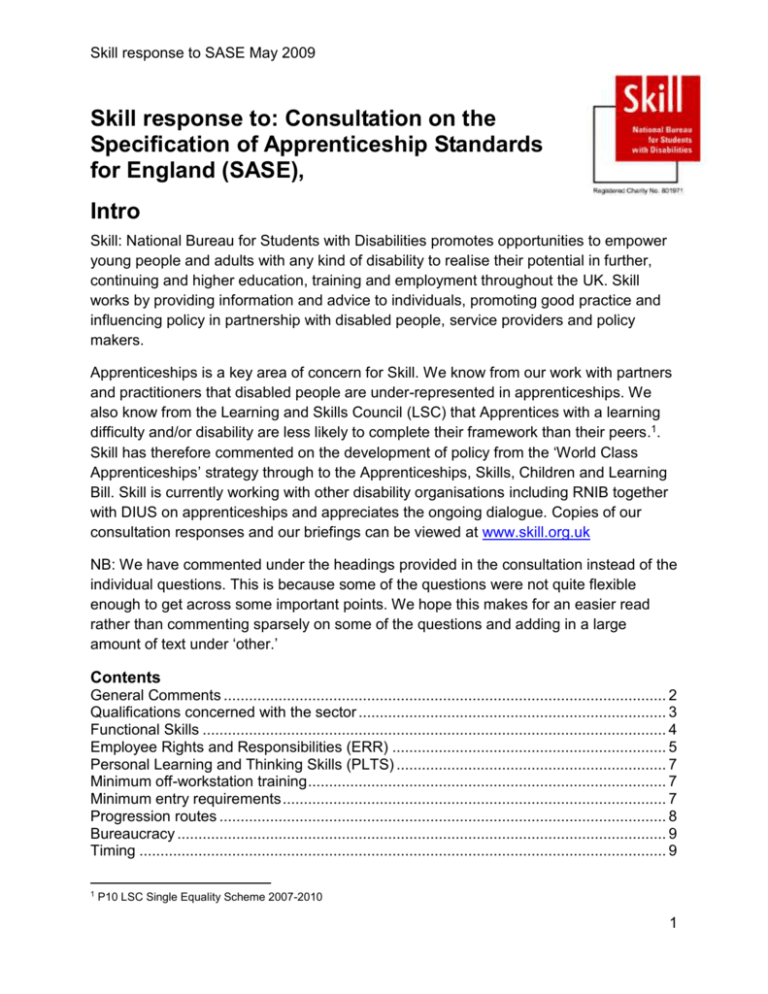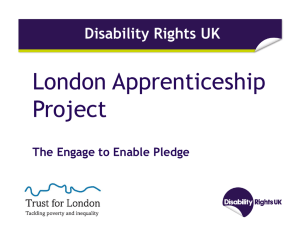Specification for Apprenticeship Standards England
advertisement

Skill response to SASE May 2009 Skill response to: Consultation on the Specification of Apprenticeship Standards for England (SASE), Intro Skill: National Bureau for Students with Disabilities promotes opportunities to empower young people and adults with any kind of disability to realise their potential in further, continuing and higher education, training and employment throughout the UK. Skill works by providing information and advice to individuals, promoting good practice and influencing policy in partnership with disabled people, service providers and policy makers. Apprenticeships is a key area of concern for Skill. We know from our work with partners and practitioners that disabled people are under-represented in apprenticeships. We also know from the Learning and Skills Council (LSC) that Apprentices with a learning difficulty and/or disability are less likely to complete their framework than their peers.1. Skill has therefore commented on the development of policy from the ‘World Class Apprenticeships’ strategy through to the Apprenticeships, Skills, Children and Learning Bill. Skill is currently working with other disability organisations including RNIB together with DIUS on apprenticeships and appreciates the ongoing dialogue. Copies of our consultation responses and our briefings can be viewed at www.skill.org.uk NB: We have commented under the headings provided in the consultation instead of the individual questions. This is because some of the questions were not quite flexible enough to get across some important points. We hope this makes for an easier read rather than commenting sparsely on some of the questions and adding in a large amount of text under ‘other.’ Contents General Comments ......................................................................................................... 2 Qualifications concerned with the sector ......................................................................... 3 Functional Skills .............................................................................................................. 4 Employee Rights and Responsibilities (ERR) ................................................................. 5 Personal Learning and Thinking Skills (PLTS) ................................................................ 7 Minimum off-workstation training ..................................................................................... 7 Minimum entry requirements ........................................................................................... 7 Progression routes .......................................................................................................... 8 Bureaucracy .................................................................................................................... 9 Timing ............................................................................................................................. 9 1 P10 LSC Single Equality Scheme 2007-2010 1 Skill response to SASE May 2009 General Comments Participation of disabled people and data collection Through Skill’s work with practitioners and learners within the Further Education (FE) sector it has become clear that disabled people are under-represented in apprenticeships. Indeed this was something acknowledged in the DIUS and DCSF ‘World Class Apprenticeships’ strategy where it stated: ‘there is significant gender stereotyping by sector, while black and minority ethnic and disabled apprentices are underrepresented’2 LSC statistics show that 10.1% of people who undertake an apprenticeship declare a learning difficulty as defined in the Learning and Skills Act3. The collection of declarations of a learning difficulty or disability in work based learning does not however include analysis of the Individual Learner Record (ILR), unlike FE returns. Analysis of ILRs is likely to show that a significant proportion of the 10.1% are people with basic skills needs and do not have a learning difficulty or disability. Data is therefore not robust and not comparable. As a result it is very difficult to establish where barriers exist to the progression and retention of disabled apprentices. Wider recommendation: The National Apprentice Service (NAS) should collect and analyse data by sector as well as by impairment, so that we can see where under representation exists. Reaching government targets and improving lives Ensuing disabled people have equal access to apprenticeships is crucial for two reasons. Firstly in order for the Government to meet its targets of 400,000 apprenticeships in England by 2020 and 190,000 completions4 it is vital that the programme appeals to and can be accessed by all groups in society. Secondly apprenticeships in many cases will lead to employment and a way out of poverty for disabled people. Labour Force statistics from 2007 indicated that only 47.2% of disabled people within working age were employed.5 The knock on effect is poverty for a large proportion of unemployed disabled people. It is estimated that around 1.5 million disabled people live in poverty.6 2 P46 World-class Apprenticeships: unblocking Talent, Building Skills for All. DIUS and DCSF (2008). Apprenticeship Framework Starts (2007/8 to 2008/9) www.thedataservice.org.uk 4 P5 World-class Apprenticeships: unblocking Talent, Building Skills for All. DIUS and DCSF (2008). 5 Labour Force Survey 2007 3 6 New Policy Institute, with support from the Joseph Rowntree Foundation, 2009 2 Skill response to SASE May 2009 In order to reach government targets and support the participation of disabled people within society as a whole, access to apprenticeships must be a priority. Ensuing equality and diversity and statutory guidance Skill together with RNIB welcomed a recent meeting with DIUS where the issues around disability and apprenticeships were discussed. If the under-representation of disabled people is to be tackled it is crucial that Sector Skills Councils (SSC) only issue frameworks to employers that have considered equality and diversity. This should be in relation to progression into the framework, entry requirements, flexibility and available support as well as progression after the Apprenticeship. It is important that this consideration to equality and diversity is not simply a ‘tick box exercise’ but that the employer has given serious consideration to the removal of barriers that prevent entry and progression. Recommendation: The SASE must specify that SSC consider equality and diversity before issuing Apprenticeship Frameworks. Skill understands that a possible outcome could be that the SASE becomes statutory guidance for SSC’s together with more general guidance on issuing frameworks. Skill strongly supports this and is keen to contribute where possible. This could be specifically on ‘disability proofing’ for Apprenticeship frameworks or providing best practice examples. It is crucial that inclusivity is a central element in this guidance so that SSC’s and employers work to address the fundamental diversity issues that was identified in ‘World Class Apprenticeships.7 Wider recommendation: Statutory guidance based on the SASE should place a key emphasis on equality and diversity and the importance of inclusive apprenticeship frameworks. Qualifications concerned with the sector Ensuring qualifications are accessible Skill agrees that knowledge and competence elements of the framework need to be separately identified in order to allow people to gain credit through other qualifications. Similarly Skill supports the widest possible access to the Qualifications and Credit Framework (QCF) in order to increase choice. Qualifications are covered by the Disability Discrimination Act (DDA). This means they must not treat disabled people less favourably, make reasonable adjustments to assessments, and have a clear competence standard. Similarly the Disability Equality 7 P46 World-class Apprenticeships: unblocking Talent, Building Skills for All. DIUS and DCSF (2008). 3 Skill response to SASE May 2009 Duty applies to awarding bodies meaning that they should carry out impact assessments when designing new qualifications. Skill has concerns about the accessibility of qualifications in that competence standards are not always identified and learners do not always get the reasonable adjustments or exam arrangements they are entitled to. We recognise that this is an issue for awarding bodies and Ofqual to address but believe that Sector Skills Councils (SSC) and the NAS have a responsibility to ensure that qualifications selected for Apprenticeships have been through the proper quality control mechanisms. Recommendation: Before issuing frameworks Sector Skills Councils must ensure that the qualifications have been through the Ofqual quality assurance process and have had a disability impact assessment carried out. Recommendation: Sector Skills Councils should ask to see disability impact assessments so that they can advise employers of adjustments needed. Flexible frameworks It is important that apprentices have the opportunity to add additional units to their framework. For disabled individuals it may be appropriate to undergo or refresh travel training skills as well as doing units on independent living. The frameworks must be flexible enough to accommodate this. Similarly appropriate credit must be transferable from the Foundation Learning Tier (FLT). A learner may be working toward a supported employment destination and have completed relevant units that can be transferable to an Apprenticeship. Recommendation: The SASE should require employers to build in the flexibility for learners to do additional optional units within their frameworks. Functional Skills From September 2007 qualification bodies have been covered by the Disability Discrimination Act and therefore functional skills qualifications should not discriminate against disabled people. There are however still barriers to apprentices with learning difficulties and/or disabilities with regards functional skills qualifications and therefore setting an attainment of a level 2 in English and Maths would disadvantage some learners. 4 Skill response to SASE May 2009 Awarding bodies should under the DDA define a competence standard. This is crucial as it defines the knowledge and level the learner needs to demonstrate.8 In defining a competence standard for an English qualification a qualification body might use a definition such as: “Each individual is confident and capable when using the skills of speaking, listening, reading and writing and is able to communicate effectively, adapting to a range of audiences and contexts. This will include being able to explain information clearly and succinctly in speech and writing.” (Previous definition of functionality within GCSE English) The above definition creates barriers specifically for people with visual and hearing impairments as it refers specifically to speaking and listening. A more inclusive definition would be: “Each individual is capable of communicating effectively and adapting to a range of audiences and contexts. This will include being able to explain information clearly and express a point of view reasonably and persuasively using a variety of methods to communicate effectively.” In the above example the definition retains the competence element but removes the barriers. Similarly it implies that a range of adjustments are possible in order to reach the standard. Instead of giving a presentation orally an apprentice with a hearing impairment could for example use a British Sign Language Interpreter (BSL). Recommendation: Sector Skills Councils and the NAS work with QCA and Ofqual who are developing ‘Inclusion sheets’ on Functional skills in English, Maths and ICT together with organisations representing disabled people. Building inclusivity into the functional skills element of apprenticeship frameworks will ensure the widest possible access. Employee Rights and Responsibilities (ERR) Skill welcomes the proposal to require all Apprentices to learn about their rights and responsibilities as workers. Skill also agrees this should be formally assessed in order to achieve the framework. It is important that disabled people’s rights are included in this unit together with the responsibilities of the employer. Almost half of disabled people have not heard of the Disability Discrimination Act (DDA) while 32% said they didn’t think anti discrimination The DDA defines a competence standard as: ‘an academic, medical or other standard applied by or on behalf of an education provider for the purpose of determining whether a person has a particular level of competence or ability’. (5.71) 8 5 Skill response to SASE May 2009 legislation existed.9 This is likely also to mean a large proportion of disabled people are unaware that employers have a duty to make reasonable adjustments in the workplace. It is also clear that a significant proportion of employers are unaware of their obligations and have not taken adequate measures to eliminate discrimination. A study carried out by Leonard Cheshire found that over half of disabled employees had experienced discrimination, while 30% of people said they had been refused adjustments by their employer.10 Recommendation: The SASE must specify that the rights of disabled people under the DDA should be included in the ERR unit together with the responsibilities and duties of employers. Wider recommendation: The NAS should work together with DWP and Employers’ Forum on Disability to raise awareness among employers of their responsibilities and duties toward disabled apprentices. Disabled apprentices and employers must also be aware of the support that Access to Work funding provides through the Department of Work and Pensions (DWP). Access to Work pays towards equipment and support that disabled people may need in the work place. This could be specific equipment such as assistive software, adapting premises, or a support worker. It can also pay towards the cost of getting to work if the person has difficulty with public transport. Skill is concerned however that currently many employers and apprentices are not aware of Access to Work funding. Recently it was found that over 30% of disabled employees were unaware of Access to Work funding.11 Furthermore there is confusion among employers over whether or not disabled apprentices are entitled to Access to Work funding. Skill has however clarified with DWP that Access to Work is available for disabled apprentices. Recommendation: The SASE should specify that details of Access to Work be included in ERR units. Wider recommendation: The NAS should work with employers to raise awareness of Access to Work. 9 P86 Experiences & expectations of disabled people. Office for Disability Issues (July 2008) P20 disability Review 2008, Leonard Cheshire Disability (2008) 11 P20 Disability Review 2008, Leonard Cheshire Disability (2008) 10 6 Skill response to SASE May 2009 Personal Learning and Thinking Skills (PLTS) Skill welcomes the intention that this area should include formative assessment and feedback to the apprentices on their progress. It is important that when referencing these skills to the National Occupational Standards (NOS), SSC’s are not inadvertently discriminating against disabled people. For example a deaf apprentice might struggle to fulfil the NOS definition of ‘team working’ because it includes reference to speaking and listening. Recommendation: The SASE should specify that when selecting PLTS, SSC must give consideration to the inclusivity of the NOS definitions to ensure they are not discriminatory. Wider recommendation: The NAS should work with NOS to ensure their definitions are inclusive. Minimum off-workstation training No comments Minimum entry requirements Entry requirements Rigid entry requirements will prevent some disabled people who are capable of working to the level 2 standard from gaining entry to an apprenticeship framework. Many disabled people take an atypical route into an apprenticeship due to barriers in more common routes and may not satisfy all academic requirements. Furthermore setting entry requirements at level 1 or above in English, maths and ICT may well disadvantage learners with sensory impairments (see ‘Functional Skills’ section). DIUS has identified inequalities in secondary education that mean disabled 16 year olds have lower GCSE attainment than those without disabilities.12 This does not mean that as a group they are all of lower ability but that they face specific barriers within the qualifications. We recommend that the Government explore the option of using a portfolio of evidence, rather than the formal qualifications alone. This may be through activities outside of school such as involvement with the Prince’s Trust and volunteering as well as work experience and non accredited courses for older learners. Recommendation: The SASE should outline how a portfolio of evidence be considered alongside academic results when considering entry to 12 P1 DIUS Disabled Students in Higher Education (May 2009) 7 Skill response to SASE May 2009 Apprenticeships. This should take into consideration relevant experience through work, volunteering and non accredited courses. Progression routes Progression routes into Apprenticeships As highlighted in the previous section some disabled people may take atypical routes into apprenticeships due to barriers inherent in the system either in education institutions or qualifications. It is also important to remember that disabled people are twice as likely to be unemployed13 as non disabled people. The progression route from employment to an Apprenticeship is a therefore limited to a few. A significant number of potential apprentices will be learning as part of the Foundation Learning Tier (FLT) of which Apprenticeships is one of the recognised outcomes. The Qualifications and Credit Framework (QCF) will be part of the FLT offer and therefore important to potential apprentices as they will be able to attain relevant units, directly building to an Apprenticeship destination. Disabled people will be present in all parts of the FLT. This could be a programme-led Apprenticeship or provision such as Supported Employment and Independent Living Routes. It is important that SSC and employers consider these different routes. Recommendation: The SASE should specify that SSC consider progression routes into Apprenticeships for disabled people both through the FLT and atypical routes. Entry to Apprenticeships must not be confined to employees. Progression from Apprenticeships Skill has found that disabled people who have reached a higher level of education are significantly more likely to gain employment than those who have not.14 This is also true for non disabled people but the difference is much starker for disabled people. It is vital for disabled people that apprenticeships are the beginning of a sustainable career where there are opportunities to obtain further qualifications and skills. It is difficult to estimate the number of disabled people on advanced apprenticeships due to the issue of poor data collection (see ‘Participation of disabled people and data collection’ at the beginning of this document) but it is likely the numbers are small. Recommendation: The SASE should specify that SSC consider progression routes from Apprenticeships not just in terms of internal work or employment but also into advanced apprenticeships. 13 Experiences and expectations of disabled people, Office for Disability Issues, July 2008 14 DRC Briefing 2007 8 Skill response to SASE May 2009 Bureaucracy No comments Timing It is crucial that a more inclusive system is in place as soon as possible so that disabled people can benefit. The NAS and DIUS will need to take into consideration their duties and responsibilities under the Equality Bill which is currently going through Parliament to not only eliminate discrimination but advance the equality of opportunity through positive action if necessary. Similarly the SASE will need to fit in with the structural changes within the FE landscape. In particular thought must be given as to how the frameworks link to the delivery of provision by Local Authorities as well as post 19 provision from the Skills Funding Agency including the Foundation Learning Tier. Skill Policy Team May 2009 9








